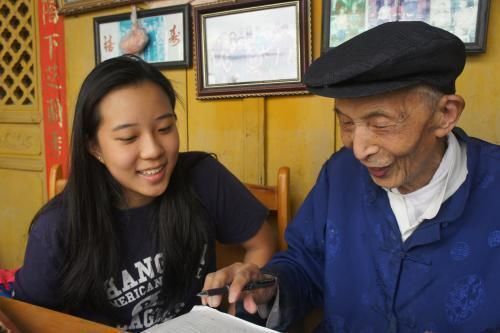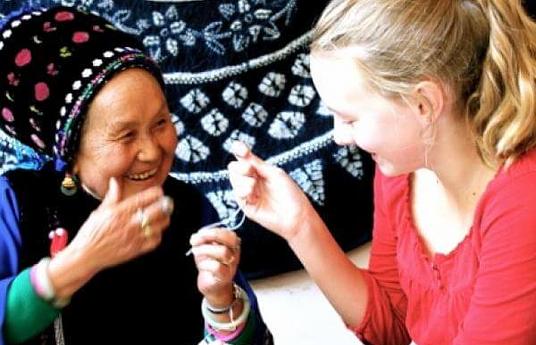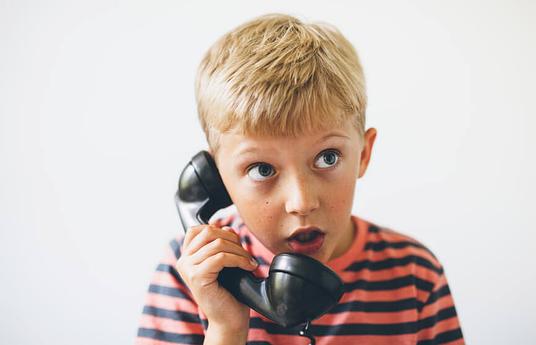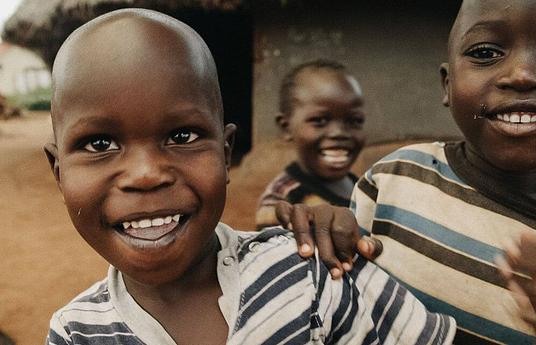Helping students to become global citizens is important for today’s world, but how do we create global citizens whilst still protecting local cultures? Globalization can threaten different ways of life, turning the whole world into one culture – usually a Westernized one.
Globalization isn’t all bad. It is through connections that cultures can evolve and develop to be more forward-thinking and tolerant, and to create better ways of life. Without an exchange of ideas, we wouldn’t have the philosophies we have today, the cultures, the art, the medicine or the technologies. All of this was possible due to connectivity, collaboration and an exchange of knowledge between different people.
Today’s young people can benefit from a globally connected world. The internet has democratized information and knowledge. No longer is it just the elite who have access to libraries of information, content is at our fingertips, and if you want to learn about something – anything – you can at the press of a few buttons. As long as you have an internet connection and a device, that is.
But with this globalization, comes the threat of loss of culture. Namely, Western culture and values being seen as ‘the norm’ and everyone else as ‘other’. Every culture has something to offer the world, and no society is finished, it’s always evolving. We, as a society, constantly need to learn, understand and respect each other in order to move forward in ways that make sense for our locality.
However, there is a backlash against the tide of globalization. In her talk, ‘Globalizing The Local, Localizing The Global’, Sheikha Al Mayassa, a patron of artists, storytellers and filmmakers in Qatar, explains, ‘Research has shown that the more that the world is global the more and more people want to be different. For us young people, they are looking to become individuals and to find the differences between themselves.’
Globalization is affecting our identities, and young people not only have to navigate who they are in the context of their immediate surroundings, but who they are in the world at large. For Sheikha Al Mayassa, this doesn’t mean us all becoming the same to fit into a globalized norm, but to celebrate and respect our differences, explaining, ‘(it’s about) globalizing the local, and localizing the global. We don’t want to be all the same. But we want to respect each other and understand each other. Therefore, tradition becomes more important, not less important.’
A way to help children from either end of the scale, whether they’re from a powerful country like the US, and therefore used to seeing their own lives reflected back to them from screens, or from a lower income country that doesn’t have the same media influence, and so their stories are at odds with the ones they’re fed, is to familiarize children with each other’s stories. Allowing them to explore these differences in a safe, informative way, where they’re exposed to people different from themselves, can help children to learn and respect different ways of life.
One project making this a tangible reality is Microcampus, where expatriate students in Shanghai discover the delicate intricacies of their host country’s culture through project-based learning. Microcampus takes students out of the city and to the countryside where they are given tasks such as interviewing local people to create a documentary. Through this face-to-face interaction, the expatriate bubble is popped and children get to understand and respect the cultures surrounding them.

Familiarizing children with unfamiliar cultures and people helps children to build other 6C skills, such as compassion and empathy. Through breaking these barriers we can help to create a globalized world that is tolerant and respectful, rather than encouraging the current power dynamics, as Sheikha Al Mayassa, says, ‘Familiarity destroys and trumps fear.’
Our identities are undeniably wound up with where we’re from, but nationality can be reductive and too simplistic to explain who we are in a globalized world. Author Taiye Selasi, in her talk, ‘Don’t Ask Where I’m From, Ask Where I’m A Local’, dissects the issues with nationality and the complexities of identity in a more enlightening way.
‘Replacing the language of nationality with the language of locality asks us to shift our focus to where real life occurs,’ explains Selasi. In projects like Microcampus, children can learn about people as individuals through asking intelligent questions, rather than making assumptions based purely on their nationality, and therefore can truly view people as individuals rather than reductive stereotypes.
Reductive stereotypes have a particularly negative effect in multiethnic societies. The question, ‘Where are you from?’ is a loaded one, as Selasi says, ‘The question where you’re from, or the question that every recent immigrant knows, where are you really from, is code for why are you here?’ It can be laden with ignorance and an imbalance of power, and can often not actually help us to get to know someone else better. Asking someone more about their experience and where they are a local, gives a greater picture. After all, with globalization we are finding that we are starting to have more in common with people half way round the world from us than those within our own country, due to the lifestyle divide between those living urban and rural lifestyles.
For Selasi, getting to know someone’s daily routines and rituals, understanding their closest relationships and realizing the restrictions in their lives tells a much deeper story about who they really are. Knowing how someone likes to spend their time, who they’re close with and what is stopping them from doing certain things, such as passport or societal restrictions, can help us truly understand an individual’s identity and experience.
Luckily, you don’t need to have the means to travel the world to expose children to other ways of life or to introduce them to life experiences different from their own. Thanks to the internet and new technologies, it has never been easier for us to share our stories with each other. The difficulty for educators is finding resources that are educationally rich, whilst meaningful and engaging for students.
Global Oneness Project is one resource that makes this easy. GOP creates educationally rich resources such as documentaries, photo essays and articles on the biggest issues of our time. They might explore the journey of a child who’s moved to Canada as a refugee, the effects of climate change on different communities, or how sound pollution is affecting humans. These stories are all accompanied with lesson plans, helping teachers to approach these complex issues with ease.
Storytelling is a particularly useful tool as it helps children to understand the real-life stories behind the newspaper headlines. As Cleary Vaughan-Lee, Executive Director at Global Oneness, told us, ‘Storytelling gets to the heart of learning. Stories create empathy and they are a way for us to learn about our real essence, about being human.’
The newest technologies bring this to life even more. With tools like VR and AR, children can experience things in a very real way without ever needing to leave the classroom. Lyfta is one VR company that focuses on exposing children to different ways of life, helping to build empathy, understanding and compassion for people all over the world. The VR experiences see children explore different ways of living, using tablets to explore 360 degree settings and short documentaries.
Michelle Massey, a teacher who uses Lyfta, explains, ‘The topics that we cover are often so removed from a child’s experience that you’re giving them facts, you’re not really teaching them. You need to make it last and make it meaningful to them, otherwise the memories of it won’t last.’ Lyfta’s approach is all about making stories meaningful, so that what children learn about other cultures and the empathy skills they build really remain with them.
Understanding the complexities of identity in a time of globalization needs to be addressed in education, so that children can learn to understand the correct terminology to use for people different from themselves without using harmful language. The problem is, children won’t know what language to use unless they’re taught it in a meaningful way. Luckily, programs like Don’t Guess My Race are making this easier for educators to contend with and can effectively halt the ignorant question of, ‘where are you really from?’
Don’t Guess My Race is a web-based program developed by Interactive Diversity, that supports the teaching of race, identity and diversity. Children are shown pictures of people from all different ethnicities and backgrounds, and are asked how that person might self-identify. They then discover how that person identifies themselves, and get familiar with different terminology, as well as discovering how complex identity can be and that they shouldn’t assume someone’s identity just by looking at them. Through using a web-programme to explore this sensitive issue, children can learn about race and identity in a safe and informative manner.
It’s also important to teach children the communication skills they need to discuss topics of identity, race and culture in a meaningful and respectful way. Using enquiry-based pedagogy, Philosophy for Children encourages critical thinking and communication skills through allowing children the space to discuss big issues.
Children come up with philosophical questions after experiencing a story or video that sparks the debate. They then discuss the issue in groups to hone their questioning skills and expand their perspective on the area. The teacher guides the children to listen, respond and build on ideas during the dialogue in order to reach a shared understanding of the question.
In a time of short, sharp social media spats, it’s empowering and necessary for children to learn how to hold meaningful discussion, to break the vicious dialogue of our times. This can help children to understand cultures different to their own, and understand how all of our unique perspectives together make up the world.
Collaboration on a global level can assist children with learning to respect people different from themselves, whilst also turning them into global citizens. Global Learning connects children in schools around the world, and are then set to work on solutions to global issues, like climate change and water shortages. Aligned with the UN Sustainability Goals, children learn that everyone has their part to play in these huge issues, and through collaboration and communication they can work together to solve today’s issues.

Penpal Schools also connects students on a global level, and enables them to work on projects together. The projects allow children to learn about other cultures whilst collaborating to solve problems. Through these projects, which allow for communication and collaboration skills to be built, we can also help children to build their character skills and identities whilst respecting those of others.
Modernization of cultures is of course an important aspect for every nation to contend with. Every culture has systemic problems and prejudices that they must overcome in order for their citizens to live freely as who they are without judgement or danger. However, this does not mean that local cultures should be eradicated, and it doesn’t mean that one culture is superior. In order to educate children to make the most of living in a globalized world, we need to show them the exceptional things we can learn from each other and teach them to respect differences where they occur. After all, it is only through collaboration and communication on a global scale that we’ll be able to face the biggest issues facing our planet and people, such as climate change.
Through understanding cultural identities, exploring these complex issues in safe environments and learning from each other, we can create global citizens who celebrate their local cultures and those of others. When this understanding and respect is truly established can today’s young people exchange ideas, collaborate and innovate in ways we can only imagine. And who knows, maybe together the next generation will come up with the answers to our world’s most pressing issues through approaching today’s problems through their unique global (and local) viewpoints.




